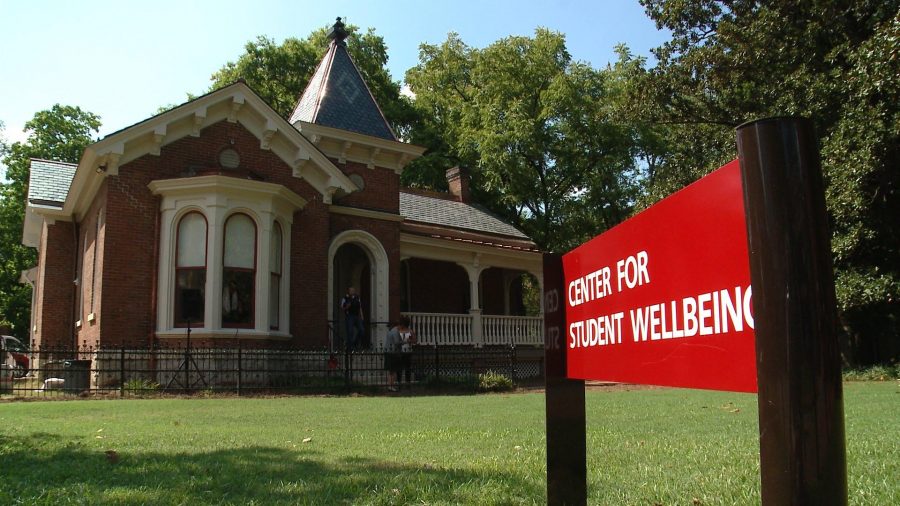Tucked away across from the Student Health Center, steps away from Medical Center North and the Eskind Biomedical Library, lies the Center for Student Well-Being, now in its third month of operation after it first opened its doors to students Aug. 31.
According to CSW director Rachel Eskridge, the center’s opening was prompted by the necessity for a location that would act as a prevention center, keeping stress and academic worries from spiraling. Among the services currently offered at the center are individual coaching appointments, an addiction recovery program, a peer-coaching program, meditation, yoga and wellbeing workshops.
On average, the center has seen around 45 students per week for individual coaching appointments over the course of the semester. They also have five Peer Guides piloting the peer-coaching program, a collaboration between the CSW and the office of Student Leadership Development aimed at providing undergraduate students with guidance and support from peers. Structured as interactive lectures, the four monthly wellbeing workshops — Resilience 101, Cultivating Well-Being, Beyond Alcohol Edu and Intro to Mindfulness — are designed to improve stress-management and coping skills. All of the workshops are offered each month and attendance counts towards GME and My Vanderbilt Experience credit.

Resilience 101 is structured around the idea that resilience is a learned quality and is a predictive factor for a person’s ability to thrive in college and beyond. The workshop emphasizes the importance of gratitude, formation of meaningful relationships and a “resilience narrative.” Intro to Mindfulness teaches basic relaxation techniques, equipping students with coping strategies for future stressful situations. Beyond AlcoholEdu expands on the mandatory AlcoholEdu module in thinking about the impact of alcohol and drugs and continues to build refusal skills. The broadest of the workshops, Cultivating Wellbeing, covers social, intellectual, emotional and physical well-being as well as assessment of personal well-being. It also touches on the importance of sleep, exercise and nutrition.
“The idea is that these are tools that you will develop when you are not in those high moments of stress and then have them as a part of your toolbox when the stress exists,” Eskridge said. “We know that eliminating stress is not an option. It’s not realistic — there will always be distressing things that occur in our lives. Making sure we have the tools to deal with stress is important, and that’s really what these workshops are about.”
Eskridge said that at the beginning of the year, the Center aimed to inform as many people as possible about its services, a large part of which happened during freshman orientation in August. Since then, workshop attendance has fluctuated, with 29 people at Beyond Alcohol Edu, five at Cultivating Well-Being, 11 at Intro to Mindfulness and 15 at Resilience 101 over the course of three months. Attendance reached a peak in September and dropped down in October, a fluctuation Eskridge attributes to class schedules and time availability.
Now nearing the end of the semester, the CSW staff met during Thanksgiving break to evaluate attendance and review services offered for next semester. For Eskridge, the main goal looking forward is to increase marketing of the center’s services. In working to achieve this goal, a CSW advisory board, made up of faculty, staff and students has been developed to inform about the services offered at the center. Characteristics for selection to the board included dedication to wellbeing issues, strong interpersonal skills and a drive to serve others. On Dec. 1, the VSG Student Health and Wellness Committee and CWS staff hosted a housewarming party from 2:00–4:00 p.m. which focused on teaching students more about the center and the services it provides.
Moving forward, Eskridge hopes that through the recent Healthy Minds Survey, a survey conducted by Vanderbilt to determine knowledge and attitudes towards mental health on campus, the center will be able to gather more data on the resources students are looking for.
“We want you to be successful, academically, personally, and I think there are tools, there are skills, there are things that students can learn and implement to help you to be more successful, and it’s not necessarily easy and it’s not necessarily going to happen overnight, but it can happen,” Eskridge said. “There are things that can be done, and that we can help you all with to really enhance your well-being. So it may require stepping out of your comfort zone, doing something that you haven’t tried before, but I really think that it’s worth it.”

